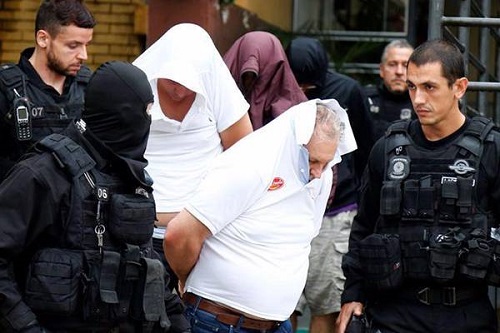Reuters photo
By
Ricardo Swire
Brazil’s sitting president, Michel Temer, is the country’s first head-of-state to be officially indicted on double criminal charges, the circumstances of the president’s latest graft accusation having the potential to be the world’s largest to date. Brazil demonstrates inconsistency with its “Clean Companies Act” enforcement, an international anti-corruption law designed to prohibit public procurement’s bid rigging, fraud and bribery. The legislation holds companies liable for corrupt activity of employees.
In June 2017 the Brazilian president was domestically charged with accepting a US$152,000 bribe from one well-known businessman. However, in August 2017 two-thirds of Brazil’s Lower House Congress voted not to prosecute the head-of-state. Brazilian law’s has a technical loophole which does not differentiate between bribes and “facilitation payments.” On Thursday September 14, 2017 a US federal summons named Brazil’s president as equivalent to an aristocratic crime syndicate boss.
Such label is verified by Brazil’s Federal Police intelligence charts that highlight the president’s Democratic Movement Party (Partido do Movimento Democrático Brasileiro or PMDB) co-conspirators, including a detained former Lower House of Congress speaker. The US’ formal indictment relates how since 2014 the Brazilian president’s graft gang illegally shared US$190 million or Reais 587 million.
According to Brazil’s Federal Police diagrams as top echelon the president illegally pocketed US$10 million or Reais 31.5 million. Payola recipients reciprocated with assignments of patsies to key government positions, such individuals advantageously manipulating the country’s public contract awards system. The Brazilian president’s graft scheme used three or more concealment methods to camouflage bribe money’s origin. The high-level clique additionally purchased foreign financial institutions to fully control FATC procedures, such activity usually indicating money laundering facilitation.
Patterns showed the President’s payola racket as a splinter of larger national fraud encompassing two engineering companies Grupo Odebrecht SA and OAS. In March 2016 Brazil Federal Police officers, conducting “Operation Car Wash,” found evidence of methodical corruption at Grupo Odebrecht SA. The local engineering titan’s office paid graft on six of twelve 2014 World Cup soccer stadiums and Olympic Legacy projects, Sao Paulo’s Arena Corinthians specially highlighted.
Evidence further suggested a parallel payola racket targeting money from state controlled oil Company Petroleo Brasileiro SA or PETROBRAS. In March 2015 OAS, Brazil’s third largest engineering and construction Company, requested court assigned bankruptcy protection to sidestep paying imposed fines. At the time OAS possessed nearly US$1.8 billion worth of global bonds, its debt valued Reais l3.4 billion or US ($1.05 billion). Some cash flow derived from assets, such as a twenty-five percent shares in Investimentos e Participações em Infraestrutura SA (INVEPAR) that manages Latin America’s busiest airport.
INVEPAR also controls the subway system in Rio de Janeiro, designed for the 2016 Olympic Games. The Company represents an amalgamation of OAS investments in Brazil and its international transport infrastructure concessions. INVEPAR’s business focus is exclusively on highways, subways and airports. Operation Car Wash investigators listed OAS and Grupo Odebrecht SA among twenty-three Companies that channelled cash from inflated contracts to executives, PETROBRAS senior representatives and select Brazilian politicians. Grupo Odebrecht SA actually operated a “bribery department” that dispatched more than US$800 million worth of graft to several participating Latin American entities.
Both Grupo Odebrecht SA and petrochemical company Braskem agreed to pay a minimum US$3.5 billion to participating local, American and Swiss officials. Operation Car Wash’s usefulness is clearly reflected in the detention of eleven senior executives from six Brazilian corporations. Brazil’s Federal Police Operation Car Wash detectives probed South Korea’s Samsung Heavy Industries Co Ltd, Swedish builder Skanska AB, Danish oil and shipping group Maersk, as well as British engineering firm Rolls Royce Holdings that paid bribes to obtain contracts with PETROBRAS. Brazil’s national oil company recorded US$5.3 billion losses.
In March 2017 a parallel US$12 billion bribery scheme, involving Brazilian public health officials in the meat exporting industry, was added to revelations. For more than ten years JBS SA, a mega meat processing plant, paid “hush money” totalling US$150 million to more than one hundred Brazilian deputies and twenty-eight senators. Graft was paid to the health inspectors and politicians to disregard standing procedures that included shipments of products with traces of salmonella and processed rotten meat. As a result China and other international countries banned beef exports from Brazil.
Ricardo Swire
Ricardo Swire is the Principal Consultant at R-L-H Security Consultants & Business Support Services and writes on a number of important issues.



No Comments Yet!
You can be first to comment this post!